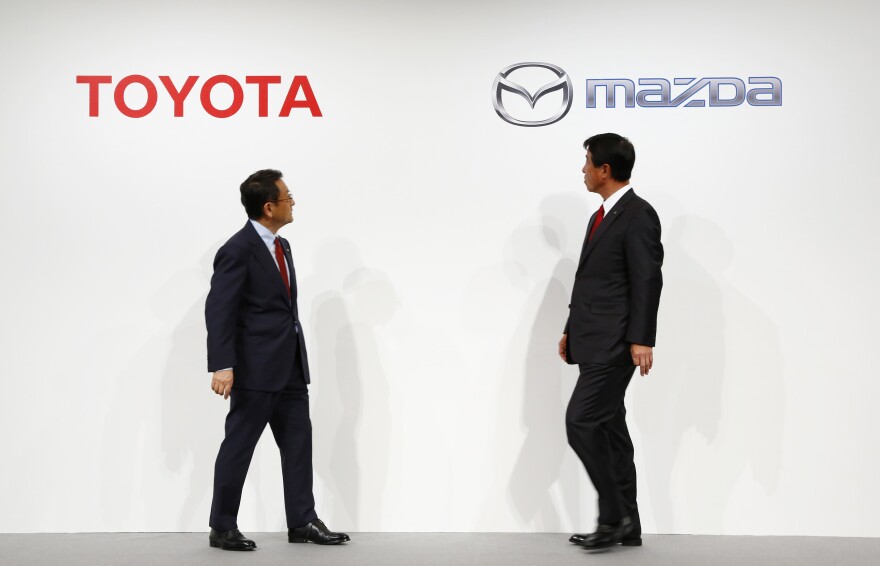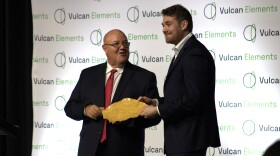When auto manufacturers Toyota and Mazda build a $1.6 billion joint manufacturing plant in Alabama, it will mark another miss for economic developers in North Carolina.
North Carolina was a finalist for the plant, which will add 4,000 manufacturing jobs near Huntsville, but ultimately lost out in the final stages of negotiations.
In an interview shortly before the official announcement, North Carolina Secretary of Commerce Tony Copeland stayed positive.
"Well as you can guess, I would prefer to have 4,000 jobs and $1.6 billion investment coming to North Carolina," he said. "We would have preferred to have a victory lap here. But, at this point in time, I'm looking forward to the next one."
State leaders offered Toyota-Mazda a tax incentive package that would have been valued at more than $1.5 billion. That would have been the largest ever offered to a company in North Carolina, according to Copeland. In addition, state and local officials in the Triad had acquired land and prepared what is now called the Greensboro-Randolph Megasite as a potential location for the Toyota-Mazda facility.
Despite those efforts, North Carolina still couldn't secure the bid.
In reviewing what went wrong, Copeland pointed to Alabama's deeper automotive cluster.
"I think it would be too simplistic to say one answer, but I think the No. 1 issue was having the concentration geographically to the Toyota manufacturing suppliers," he said.
While North Carolina has some automotive jobs, it lags other states in the Southeast, particularly in automotive manufacturing and suppliers. The interactive chart below shows total jobs by state in automotive manufacturing and supply. Hover the mouse over each bar to see the individual manufacturer. Data supplied by the Alliance of Automobile Manufacturers. Note: This chart does not include the 4,000 Toyota-Mazda jobs.
It's the Supply Chain
Nichola Lowe, a UNC-Chapel Hill associate professor with a specialization in economic development, agreed with Copeland's assessment.
"I think one of the big issues relates to supply chain capacity. Which suggests that we need to be thinking about more than just incentive programs, or whether we have the land to place a large scale facility," she said.
But that raises a chicken-and-egg paradox. Auto manufacturers pass over North Carolina because it doesn't have a critical mass of small- and mid-sized suppliers. But these suppliers won't plant roots in North Carolina because they would be too far away from major car manufacturers.
Offering a solution, Lowe pointed out that North Carolina has a strong aerospace cluster, particularly in the Triad. These suppliers could potentially serve the automotive industry as well, helping to build up the industry.
"For many suppliers, they can actually serve multiple industries," she said. "And I think a key step is to identify those suppliers where they could support existing industries within our state, but could also serve an automotive manufacturer.
Should North Carolina Want an Automotive Manufacturing Plant?
Discussions about how to attract an automotive manufacturer begs a very important question: Are these jobs even worth pursuing?
Duke University associate professor of economics Ryan McDevitt argues they are not.
"I think politicians get a little carried away. They want a very tangible victory, trying to secure a big win and say they are bringing a lot of jobs to the area. But the evidence that I've seen in economics is very mixed on whether these actually have long-term benefits for the community," he said. "You know, 4,000 jobs sounds like a lot – and it is – but at the expense of $1.5 billion-plus in incentives, you have to weigh some of those costs and benefits, and it's not clear-cut whether it actually makes sense to be in these competitions."
Consider McDevitt's argument: The 4,000 workers who take these jobs need to drive on roads to get to work, will send their children to local schools, will require police and fire protection, and use any and all government services just like employees of any other company. However, the company that receives the big tax break will get a discount on what it pays to fund these programs. Those costs don't disappear, of course, but are spread out among existing businesses and residents, often in the form of higher tax rates.
This inherently sends the wrong message to existing businesses as well, he said.
"There are a lot of other ways we can invest that money that would probably have even better effects for the economy," he said. "So let's invest more in education, fix our infrastructure. Have people naturally want to come to North Carolina, not have to entice them with these incentives."
Alabama Gov. Kay Ivey and company executives made the Toyota-Mazda announcement in a Wednesday news conference. The plant will be able to build 300,000 vehicles per year and will produce the Toyota Corolla compact car for North America and a new small SUV from Mazda, the companies have said.
"This is indeed a great day in Alabama," said Ivey.








